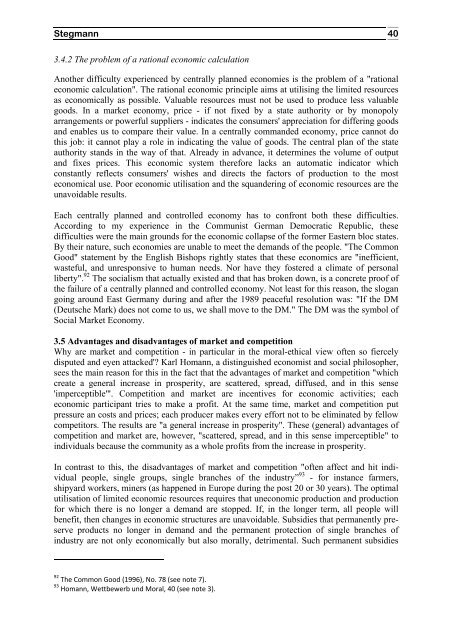Prof. Franz Josef Stegmann Bethlehem Social ... - Ordo Socialis
Prof. Franz Josef Stegmann Bethlehem Social ... - Ordo Socialis
Prof. Franz Josef Stegmann Bethlehem Social ... - Ordo Socialis
You also want an ePaper? Increase the reach of your titles
YUMPU automatically turns print PDFs into web optimized ePapers that Google loves.
<strong>Stegmann</strong><br />
3.4.2 The problem of a rational economic calculation<br />
Another difficulty experienced by centrally planned economies is the problem of a "rational<br />
economic calculation". The rational economic principle aims at utilising the limited resources<br />
as economically as possible. Valuable resources must not be used to produce less valuable<br />
goods. In a market economy, price - if not fixed by a state authority or by monopoly<br />
arrangements or powerful suppliers - indicates the consumers' appreciation for differing goods<br />
and enables us to compare their value. In a centrally commanded economy, price cannot do<br />
this job: it cannot play a role in indicating the value of goods. The central plan of the state<br />
authority stands in the way of that. Already in advance, it determines the volume of output<br />
and fixes prices. This economic system therefore lacks an automatic indicator which<br />
constantly reflects consumers' wishes and directs the factors of production to the most<br />
economical use. Poor economic utilisation and the squandering of economic resources are the<br />
unavoidable results.<br />
Each centrally planned and controlled economy has to confront both these difficulties.<br />
According to my experience in the Communist German Democratic Republic, these<br />
difficulties were the main grounds for the economic collapse of the former Eastern bloc states.<br />
By their nature, such economies are unable to meet the demands of the people. "The Common<br />
Good" statement by the English Bishops rightly states that these economics are "inefficient,<br />
wasteful, and unresponsive to human needs. Nor have they fostered a climate of personal<br />
liberty". 92 The socialism that actually existed and that has broken down, is a concrete proof of<br />
the failure of a centrally planned and controlled economy. Not least for this reason, the slogan<br />
going around East Germany during and after the 1989 peaceful resolution was: "If the DM<br />
(Deutsche Mark) does not come to us, we shall move to the DM." The DM was the symbol of<br />
<strong>Social</strong> Market Economy.<br />
3.5 Advantages and disadvantages of market and competition<br />
Why are market and competition - in particular in the moral-ethical view often so fiercely<br />
disputed and eyen attacked'? Karl Homann, a distinguished economist and social philosopher,<br />
sees the main reason for this in the fact that the advantages of market and competition "which<br />
create a general increase in prosperity, are scattered, spread, diffused, and in this sense<br />
'imperceptible'". Competition and market are incentives for economic activities; each<br />
economic participant tries to make a profit. At the same time, market and competition put<br />
pressure an costs and prices; each producer makes every effort not to be eliminated by fellow<br />
competitors. The results are "a general increase in prosperity". These (general) advantages of<br />
competition and market are, however, "scattered, spread, and in this sense imperceptible" to<br />
individuals because the community as a whole profits from the increase in prosperity.<br />
In contrast to this, the disadvantages of market and competition "often affect and hit individual<br />
people, single groups, single branches of the industry” 93 - for instance farmers,<br />
shipyard workers, miners (as happened in Europe during the post 20 or 30 years). The optimal<br />
utilisation of limited economic resources requires that uneconomic production and production<br />
for which there is no longer a demand are stopped. If, in the longer term, all people will<br />
benefit, then changes in economic structures are unavoidable. Subsidies that permanently preserve<br />
products no longer in demand and the permanent protection of single branches of<br />
industry are not only economically but also morally, detrimental. Such permanent subsidies<br />
92 The Common Good (1996), No. 78 (see note 7).<br />
93 Homann, Wettbewerb und Moral, 40 (see note 3).<br />
40















